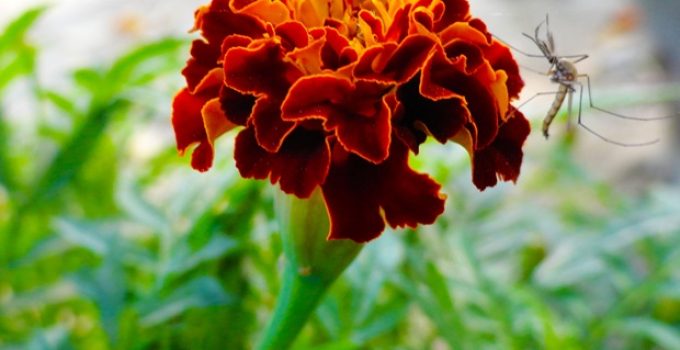Do Marigolds Repel Mosquitoes?
Can a flower really keep mosquitoes away? Marigolds, with their bright orange and yellow blooms, are often praised in gardening circles for their pest-repelling properties. But do marigolds actually repel mosquitoes—or is it just a fragrant myth?
The answer: Yes, marigolds can help repel mosquitoes, thanks to a natural compound they produce called pyrethrin. However, their effectiveness is limited and depends on how and where they’re used. While they’re a helpful addition to a mosquito-control strategy, they’re not a standalone solution.
Dive Deeper
- 🌼 Why Are Marigolds Believed to Repel Mosquitoes?
- 🧪 How Does Pyrethrin Affect Mosquitoes?
- 🪴 Do Marigolds Work Alone?
- 🏡 How to Use Marigolds to Repel Mosquitoes
- 🧯 Other Natural Mosquito-Repelling Plants
🌼 Why Are Marigolds Believed to Repel Mosquitoes?
Marigolds (Tagetes spp.) have been used for centuries in gardens not just for their looks, but also for their scent. The strong, musky odor is produced by natural chemicals, particularly pyrethrin, which is known to repel many insect pests—including mosquitoes (University of Vermont Extension, 2018).
This reputation isn’t just folklore. Marigolds are commonly listed as companion plants in vegetable gardens to keep away aphids, whiteflies, and yes—mosquitoes. They’re easy to grow, low maintenance, and thrive in sunny spots, making them an appealing natural option for pest control.
🧪 How Does Pyrethrin Affect Mosquitoes?
Pyrethrin is a natural insecticide derived from chrysanthemum and marigold species. It affects mosquitoes by disrupting their nervous system, leading to paralysis and eventually death. It’s used in many commercial insect repellents and sprays.
However, the concentration of pyrethrin in marigolds isn’t high enough to be lethal to mosquitoes—at least not in plant form. Instead, the smell deters mosquitoes from lingering in the area. The effectiveness can vary depending on how many plants you have and environmental conditions like wind or rain.
🪴 Do Marigolds Work Alone?
Not exactly. While marigolds can help reduce mosquito activity, they won’t eliminate the problem entirely. A few potted marigolds on your porch likely won’t be enough to stop mosquitoes from finding you.
Their power is strongest when combined with other natural and mechanical methods, like:
- Removing standing water
- Using citronella candles
- Installing window screens
- Wearing insect repellent
Think of marigolds as a helpful tool in your mosquito-fighting toolbox, but not the only one you should rely on.
🏡 How to Use Marigolds to Repel Mosquitoes
To maximize their effectiveness, use marigolds strategically in your landscape:
- Plant them near entrances like doorways and windows where mosquitoes may try to enter your home.
- Surround outdoor seating areas like patios, decks, and porches.
- Place potted marigolds on balconies and around garden beds, especially those with vegetables.
- Choose French marigolds (Tagetes patula) or Mexican marigolds (Tagetes erecta)—they have the strongest scent and higher levels of pyrethrin.
Make sure to deadhead (remove spent blooms) to keep them producing flowers (and scent) throughout the season.
🧯 Other Natural Mosquito-Repelling Plants
If you’re interested in an all-natural mosquito-resistant garden, consider adding these other well-known plants alongside marigolds:
- Citronella grass – The original source of citronella oil.
- Lavender – Calming for people, irritating to mosquitoes.
- Lemon balm – Contains citronellal and smells like lemons.
- Basil – Strong-scented and perfect for sunny herb gardens.
- Catnip – Surprisingly more effective than DEET in some studies (Peterson & Coats, 2001).
Combining these with marigolds can create a vibrant and effective barrier against mosquitoes—while also adding color and fragrance to your yard.
🧠 Final Thoughts
Marigolds do repel mosquitoes—but only to a degree. Their scent, especially when concentrated, can deter these buzzing pests, and their pyrethrin content contributes to their effectiveness. Still, they’re best used as part of a larger mosquito management plan. If you want to enjoy your garden or porch mosquito-free, let marigolds be your bright and beautiful first line of defense—but not your only one.
🧾 References
- University of Vermont Extension. “Plants that Repel Insects.” UVM, 2018, www.uvm.edu/sites/default/files/media/InsectRepellingPlants.pdf.
- Peterson, Christopher J., and Joel R. Coats. “Insect Repellents—Past, Present and Future.” Pesticide Outlook, vol. 12, no. 4, 2001, pp. 154–158.
- United States Environmental Protection Agency. “Pyrethrins and Pyrethroids.” EPA, www.epa.gov/insect-repellents/pyrethrins-and-pyrethroids.
